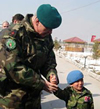Number 22 | September 11, 2007
The following are excerpts from an article by David Miliband, British Secretary of State for Foreign and Commonwealth Affairs, printed in the Daily Telepgraph on September 5, 2007, prior to his official visit to Turkey. The full article may be viewed at www.telegraph.co.uk.
In the 20th century, Britain's national security came under threat from hostile nations. Today, the threat is from terrorist groups, such as al-Qa'eda, operating within failed states, seeking to fracture the world along religious lines.
The response by the police and the Army, at home and abroad, is necessary, but on its own not enough. To marginalise extremists, we have to address causes as well as symptoms.
(…) The activities and narrative of al-Qa'eda seek to emphasise that which divides us. Our task is the reverse: to nurture understanding, tolerance and commitment across religions, ethnicities and nations and to marginalise extremists. (…) That is why I am visiting Turkey this week.
In bridging the gap between Europe and Asia, in showing that common humanity overshadows religious differences, there is no more pivotal country than Turkey.
Turkey gives lie to the argument that democratic values and a secular democratic state are incompatible with a Muslim majority. As Turkey's new president said: "A country cannot claim to be contemporary if even a single citizen is being discriminated against based on his or her religious, linguistic or ethnic characteristics or economic status."
Our challenge is to translate the values and interests we share into projects and activities that can build solidarity. In the Middle East, Turkey can add a new dimension to our efforts to bring security and prosperity to the region. In Iraq, Turkey has been instrumental in supporting the democratic process, in particular, in securing the participation of the Sunni Arab community in the elections in December 2005.
Strong trading relationships are developing, with Turkey now a major investor in Iraq. In Afghanistan, Turkey is playing a key role as part of Nato. Turkish organisations are involved in building schools for girls. In relation to securing our energy supplies, Turkey is an increasingly important transit route for oil and natural gas, with 10 per cent of the world's oil flowing through the Bosphorus.
Shared projects and activities are required to tackle the shared threats we face. But we also need to extend and strengthen our shared institutions. For us, that means the EU - an alliance of sovereign nation states that know that shared endeavour can deliver better results.
(…) Europe needs to be a force for economic, social and environmental good beyond its borders in order to be a force for good within its borders.
That project of an outward-looking EU needs, as a clear goal, the inclusion of Turkey as a full and equal member. Turkey and the rest of Europe are bound together by a shared belief in democracy and by shared interests. Membership of the European Union will help to further those shared interests and values and reconcile differences.
(…) The next steps are clear. The EU must keep its promises and encourage the process of negotiations to run its course. Discussions on Turkey's accession will continue in the enlargement working group under the Portuguese presidency. Turkey, by its behaviour, can help disarm the sceptics. Looking again at the problematic issues surrounding freedom of expression is critical, as is progress on Cyprus.
(…) If Turkey can play a role as a member of the European Union, engaged in shared projects, promoting shared values, the prize for Turkey, for Britain and for Europe as a whole is immense: to witness an age where the world is not only more connected, and more interdependent, but also more at ease with the different identities that Turkey bridges, and, as a result, more secure.
Institutions matter. And outward-looking, open, engaged institutions have life and vitality. That is what we need from the EU. And that is why we need the benefits as well as the challenges of Turkish accession.
David Miliband is Secretary of State for Foreign and Commonwealth Affairs.

























